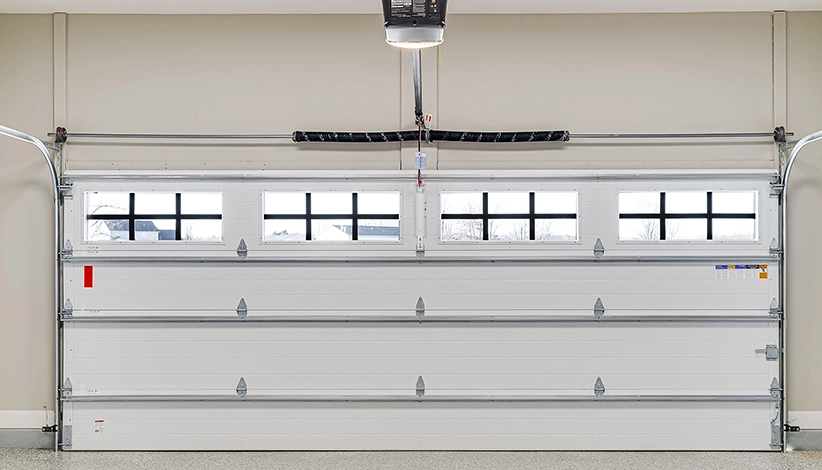How to Fix a Noisy Garage Door: Comprehensive Guide for Homeowners

That grinding screech every morning is your garage door crying out for help. Whether it's rattling like a ghost chain or humming like an off-key singer, garage door noises typically stem from two main culprits: the door itself or the opener. Those squeaks and groans are often early warning signs of wear and tear that could lead to bigger problems. Think of those sounds as your garage's way of asking for a little TLC. By addressing these noises early, you're potentially saving yourself from costly repairs down the road. Here we’ll review common issues that can cause a noisy garage door and what you can do to fix them.
Ever wonder what your garage door is trying to tell you? Different noises point to different problems, and learning to decode these sounds is like becoming a garage door whisperer.
Squeaking and creaking — those high-pitched protests — often mean your door's moving parts need lubrication. Metal-on-metal contact between dried-out rollers and tracks is usually the culprit, though worn rollers or hinges can also create this nail-on-chalkboard noise.
When you hear grinding noises, pay attention. This usually signals trouble with your door's fundamental components. Misaligned tracks force rollers to fight their way along the path, while worn gears in your opener can also grind. Both issues start small but can escalate quickly.
Banging or clanging sounds? This often means loose or broken hardware. Broken springs make a particularly dramatic entrance, announcing themselves with a loud bang that sounds like a car backfiring. Loose chain drives or worn opener components can also give a loud warning.
Rattling sounds are the puzzle of garage door problems. They typically point to loose hardware somewhere in the system — think bolts that have wiggled free over time, chain drives that need adjustment, or mounting brackets that have come loose from your garage frame.
Ready to silence that noisy garage door? Let's tackle these fixes one at a time, starting with the easiest solutions first.
Lubrication is your first line of defense against garage door noise. Skip the WD-40 — it's not actually a lubricant. Instead, grab a silicone-based spray or lithium grease. Start with the rollers, applying lubricant where they meet the tracks. Move on to the hinges, springs, and chain or belt drive. A little goes a long way here — you want a light coating, not a greasy mess.
Got your socket set handy? Time to play detective with loose hardware. Work your way around the door, checking every nut, bolt, and bracket. Pay special attention to the hinges and mounting brackets — these are prime suspects for rattling sounds. Just don't overtighten; you might damage the door or strip the threads.
For track alignment issues, look for gaps between rollers and track walls or spots where the door seems to stick. If you notice misalignment, loosen the mounting brackets slightly, adjust the track position, and retighten. The door should move smoothly without any metal-on-metal contact.
When it comes to worn parts, rollers are usually the first to go. Metal rollers? Consider upgrading to nylon ones — they're naturally quieter. But if it’s your springs and cables making the noise, that's pro territory. If you hear popping sounds or notice broken springs, call a professional immediately.
Speaking of professionals, they're your best bet for opener issues. If your chain drive sounds like it's dragging, or your belt drive is shrieking, it's time for expert help. Some noise issues signal bigger problems that require specialized tools and knowledge to fix safely.
Want to prevent those garage door noises before they start? A little regular maintenance goes a long way.
Mark your calendar for quarterly inspections — more often if your door gets heavy use. Listen and watch your door through a full cycle, noting any new sounds or hesitations. Check the rollers, tracks, and springs for signs of wear, and keep an eye out for loose hardware or damaged weatherstripping.
Here's a maintenance tip many homeowners forget: clean those tracks. Dirt, leaves, and debris can create quite a racket when caught between rollers and tracks. A quick wipe-down with a damp cloth, followed by drying, keeps things running smoothly. While you're at it, clear any spider webs or debris from the sensors to prevent operation issues.
Seasonal changes hit garage doors hard. Before winter, lubricate all moving parts to prevent freezing. When spring rolls around, check for any water damage or rust spots. Summer heat can expand metal components, so adjust spring tension if needed. Fall's the perfect time to weatherproof everything before the cold returns.
While DIY fixes can solve many garage door noise issues, some problems demand professional expertise. If your door still sounds out of sorts after basic maintenance, or if you notice the door becoming unbalanced, it's time to call in the pros. Other red flags include grinding noises that won't quit, sudden loud bangs, or any issues with springs or cables — these components can cause serious injury if mishandled.
Remember: a properly maintained garage door should operate almost silently. Regular checks and basic upkeep can prevent most noise problems, but don't hesitate to contact a certified garage door technician when things seem off. Your safety is worth more than the cost of a service call. For peace of mind (and peace and quiet), reach out to a local Clopay garage door specialist for a professional inspection.

